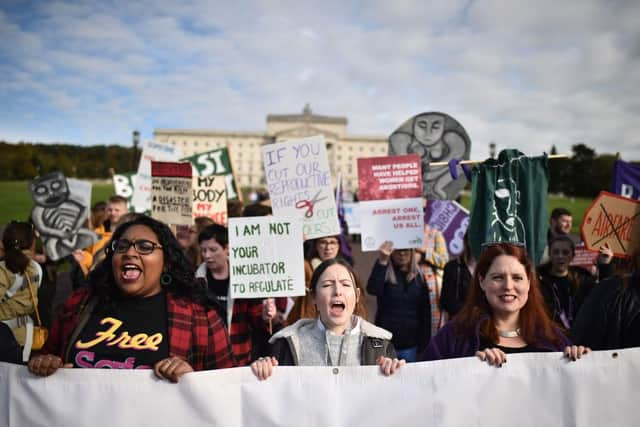What are the abortion laws in Northern Ireland? Rules explained - and how they compare to rest of UK
and live on Freeview channel 276
TV show Three Families will tonight show the journey of three different women seeking abortions in the years leading up to decriminalisation in Northern Ireland
Until the liberalisation of abortion laws in Northern Ireland in 2019, the country had some of the strictest rules on pregnancy termination in Europe.
Advertisement
Hide AdAdvertisement
Hide AdThis is what the laws were before, and how they compare to the rest of the UK.


What was abortion law in NI before 2019?
The liberalisation of abortion laws which Britain saw in the 1960s were never extended to Northern Ireland, where abortion was only legal in extremely limited circumstances.
These circumstances were if a woman’s life was at risk, or where there was deemed to be a risk of permanent and serious damage to her mental or physical health if the pregnancy were not terminated.
This meant that diagnoses of fatal fetal abnormalities, incest and rape did not count as grounds for a legal abortion. Women, girls and any abortion providers could be prosecuted for pregnancy terminations.
Advertisement
Hide AdAdvertisement
Hide AdIn many cases, this meant women were forced to travel to England for abortions.
How did this differ from the rest of the UK?
In 1967, the Abortion Act made abortions legal in the UK up to 24 weeks in most circumstances.
However, abortions still have to be approved by two doctors, who must agree that the woman having the baby would pose a greater risk to her physical or mental health than terminating the pregnancy.
The coronavirus pandemic ushered in new rules around “at-home” abortions, meaning women no longer had to attend an abortion clinic to take one of the prescribed pills, but could take both at home.
Advertisement
Hide AdAdvertisement
Hide AdWhile some organisations like BPAS are now campaigning for the option to be made available permanently, some pro-life groups are opposed to the move.
What changed in 2019?
Abortion was decriminalised in Northern Ireland in October 2019.
This happened because MPs in London voted for legislation requiring Northern Irish abortion laws to be changed if the Northern Ireland Assembly was not restored by a deadline at the close of the month.
In spite of a last-ditch recall attempt by the Assembly, the move failed and the changes went ahead.
Advertisement
Hide AdAdvertisement
Hide AdThis meant that neither healthcare workers nor women and girls who sought an abortion could be prosecuted.
What has happened since abortion was decriminalised?
It hasn’t been a smooth ride for those seeking pregnancy terminations in Northern Ireland even following decriminalisation.
A new legal framework for abortion was created by the British government and came into effect from March 31, 2020, making termination legal in in all circumstances in the first 12 weeks of pregnancy, and beyond that in other cases such as fatal fetal abnormality.
Yet following the Assembly being recalled, they backed a non-binding motion brought by the DUP rejecting changes to abortion law.
Advertisement
Hide AdAdvertisement
Hide AdWhile some of Northern Ireland’s health trusts began operating abortion services in 2020, Amnesty International claimed in October that women face a “postcode lottery” for services in the country, with some trusts closing due to limited resources.